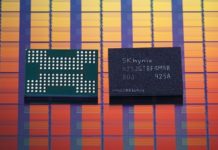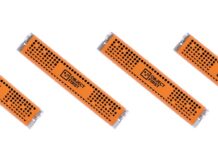
Dr. Niraj Tolia, Alcion’s CEO and co-founder, was awarded the Distinguished Alumni Award by Carnegie Mellon’s Parallel Data Lab (PDL). The PDL, founded in 1992, looks at new data system architectures, technologies, and design methodologies. This award, only previously awarded five times in PDL’s history, recognizes Dr. Tolia’s seminal work and industry impact in the areas of storage and distributed systems with his academic work having been cited over 3,900 times. His industry impact can be seen in his work as CEO and co-founder at Kasten (acquired by Veeam Software) that provided Kubernetes data protection, and work on object-storage based file systems at Maginatics (acquired by Dell EMC).
…
Cloud and backup storage services supplier Backblaze announced another edition of its regular disk drive statistics blog looking at annualized failure rates (AFR). There were no surprises. But 354 drives exceeded their rated maximum temperature in Q3, with 2 failing and 352 continuing, apparently OK. It said: “Beginning in Q4, we will remove the 352 drives from the regular Drive Stats AFR calculations and create a separate cohort of drives to track that we’ll name Hot Drives. This will allow us to track the drives which exceeded their maximum temperature and compare their failure rates to those drives which operated within the manufacturer’s specifications. While there are a limited number of drives in the Hot Drives cohort, it could give us some insight into whether drives being exposed to high temperatures could cause a drive to fail more often.” It will also monitor drive AFRs by data center, cluster amd storage pod (overall enclosure)
…
Cohesity is working with Microsoft to deliver improved backup and recovery performance for Microsoft 365 environments via the integration of native APIs of Microsoft 365 Backup Storage with Cohesity DataProtect.
…
Commvault has announced its participation in the Microsoft Security Copilot Partner Private Preview. It is working with Microsoft product teams to help shape Security Copilot product development in several ways, including:
- Validation and refinement of new and upcoming scenarios
- Providing feedback on product development and operations
- Validation and feedback of APIs to assist with Security Copilot extensibility
There’s more information in a Microsoft blog.
…
Cloudera announced support for Nvidia multigenerational GPU capabilities for data engineering, ML and AI in both public and private clouds to help customers build applications for AI. This will involve accelerating AI and ML workloads in Cloudera on Public Cloud and on-premises using Nvidia GPUs and Cloudera Machine Learning, and accelerating data pipelines with GPUs in Cloudera Private Cloud using Cloudera Data Engineering.
…
CrashPlan announced new packages for small businesses and general consumers. They provide tiered offerings and include automatic backup of every file version across Windows, macOS, and Linux devices. There are two flavors:
- CrashPlan Essential: A cost-effective offering that includes fully encrypted backup for individual users. For $2.99 a month, users can protect up to 200GB of data with automatic cloud backups, encryption, unlimited versioning and file restore workflows, with the flexibility to add storage for $1 for every 100GB as needs grow.
- CrashPlan Professional: An endpoint backup package with unlimited versioning, and per-user encryption for small businesses and creatives. Users get the same backup functionality, with unlimited cloud storage capacity and file versioning for $8 a month. It supports multiple users and adds admin features optimized for small-to-medium businesses including secure service access (SSA).
The unlimited versioning enables faster and more granular file recovery. CrashPlan provides 256-bit AES encryption for data in transit and at rest.
…
The CXL Consortium announced the release of the Compute Express Link (CXL) 3.1 specification with improved fabric manageability to take CXL beyond the rack and enable disaggregated systems. It features:
- CXL Fabric Improvements/Extensions – scale-out of CXL fabrics using PBR (Port Based Routing) supporting tree, mesh, ring, star, butterfly and multi-dimensional topologies
- Host-to-Host communication with Global Integrated Memory (GIM) concept
- Trusted-Execution-Environment Security Protocol (TSP) – allows for Virtualization-based Trusted Execution Environments (TEEs) to host Confidential Computing Workloads
- Memory Expander Improvements – up to 34-bit of metadata and RAS capability enhancements
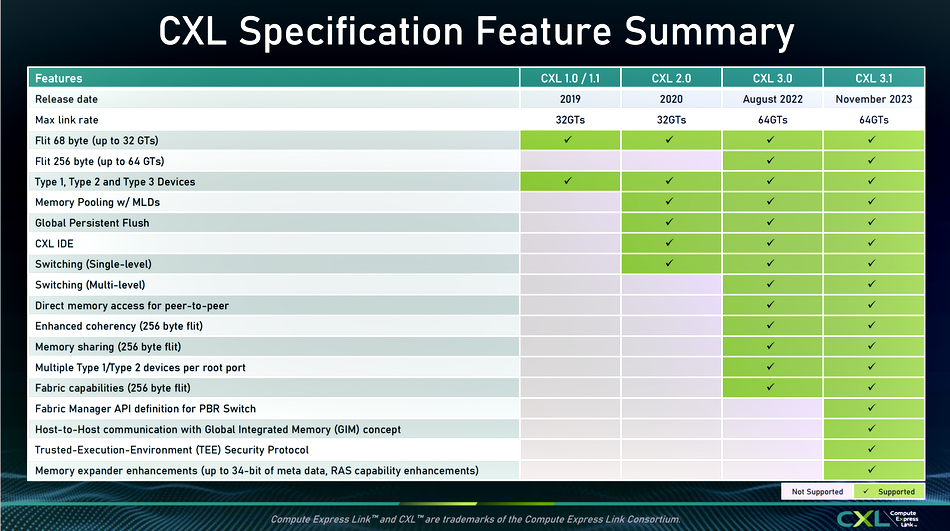
Get an evaluation copy of the CXL 3.1 spec here.
…
DDN and Tel-Aviv-based NextSilicon announced an optimized end-to-end compute to network to storage system for better datacenter I/O performance. DDN’s AI400NVX2 Storage appliance is connected simultaneously and directly to high-speed InifiniBand and Ethernet networks and to NextSilicon’s Maverick processor. The setup uses RDMA to bypass CPU bottlenecks and pass data directly from the DDN storage to the accelerated NextSilicon processing unit. In other words, GPUDirect-like access to a non-Nvidia accelerator. The NextSilicon software suite adapts the Maverick processor into a workload-specific ASIC, at runtime. NextSilicon is developing software algorithms that reconfigure NextSilicon’s hardware, improving performance based on runtime telemetry. The hardware has distributed HBM memory access.
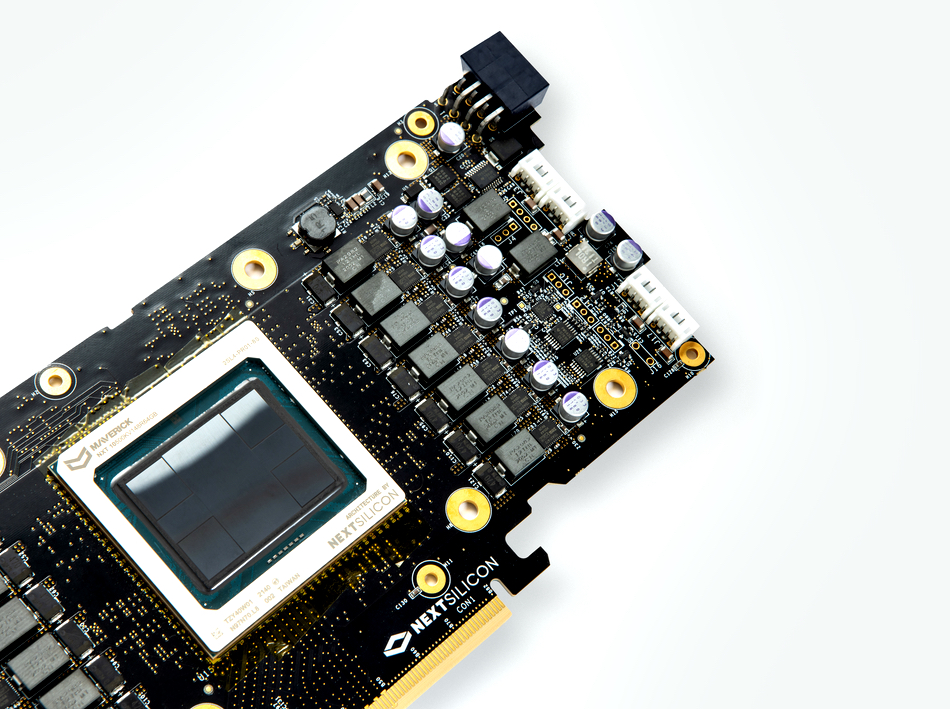
…
DDN says it and Sandia National Laboratories have partnered over the last 3.5+ years to design a next generation parallel storage system to meet the needs of current and future scientific workloads executing on large-scale High Performance Computing (HPC) systems. This tie up has resulted in designing extensions for DDN’s new Infinia product, which targets HPC storage workloads. This will bring the world’s fastest object store to bear on HPC’s hardest storage problems. Matthew Curry, Principal Member of Technical Staff at Sandia, said: “We have found that by allowing DDN and a diverse representation of subject matter experts from DOE laboratories to jointly participate in design activities, Infinia’s architecture can be broadened to handle the gamut of DOE workloads and beyond, contributing to mission success for DOE and a wider market for DDN.”
…
Dropbox and Nvidia announced a collaboration to improve productivity for Dropbox customers by using AI. Dropbox plans to use Nvidia’s AI Foundation Models, AI Enterprise software and GPU-accelerated computing to enhance Dropbox Dash, universal search that connects apps, tools, and content in a single search bar; and Dropbox AI, a tool that allows customers to ask questions and get summaries on large files across their entire Dropbox estate. “The arc of AI is expanding from cloud services into enterprise generative AI assistants that will drive the most significant transition in the computing industry to date,” said Jensen Huang, founder and CEO of Nvidia. “Together, Nvidia and Dropbox will pave the way for millions of Dropbox customers to accelerate their work with customized generative AI applications.”
…
Automated data movement pipeline supplier Fivetran announced support for Microsoft OneLake through integration with Microsoft Fabric as a new data lake destination. Fivetran has been named a Microsoft Fabric Interoperability Partner. Together with support for Delta Lake on Azure Data Lake Storage (ADLS) Gen2, also announced today, Fivetran customers now have two Microsoft data lake destinations to consolidate their data workloads with any of Fivetran’s 400-plus pre-built, fully managed data pipelines. Fivetran claims that, because Fit automates data extraction, cleansing, conforming and converting data to Delta Lake format, customers are able to move faster in developing AI and generative AI-based projects.
…
GigaIO has enabled a single SuperNODE x86 server to support 32 GPUs, twice as many as Liqid, using its FabreX dynamic memory fabric over a shared PCIe bus. The GigaIO SuperNODE is shipping now, available directly from Dell, Supermicro, and selected channel partners. FabreX provides the ability to create composable systems that allocate PCIe devices across multiple servers. GigaIO’s SuperNODE system was tested, using Hashcat and Resnet 50, with 32 AMD Instinct MI210 accelerators on a Supermicro 1U server powered by dual 3rd Gen AMD EPYC processors.
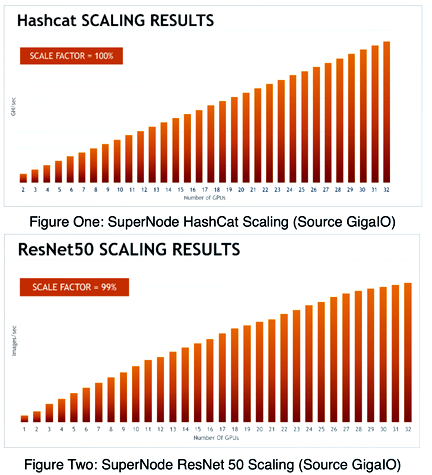
It has also announced a SuperDuperNODE supporting up to 64 GPUs.
…
Huawei’s OceanStor Pacific object storage system ranked highest in five out of seven use cases in the latest Gartner Critical Capabilities for Distributed File Systems and Object Storage report.
…
Lenovo announced Q2 fy2024 revenues of $14.4 billion, 16 percent lower than a year ago. There was a $273 million profit, 54 percent down on the year. But Lenovo revenues have now inceased for two successive quarters and it sees clear signs of recovery across the technology sector.
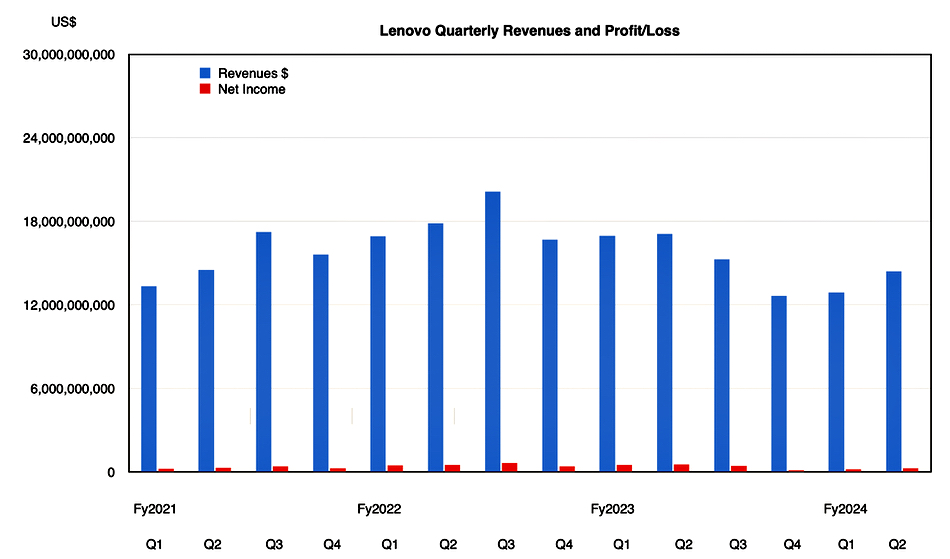
The segment revenues were:
- Intelligent Devices Group (PCs) – $11.5 billion, down 16 percent y/y
- Infrastructure Solutions Group – $2 billion, down 23 percent
- Solutions and Services Group – $1.9 billion, up 11.8 percent
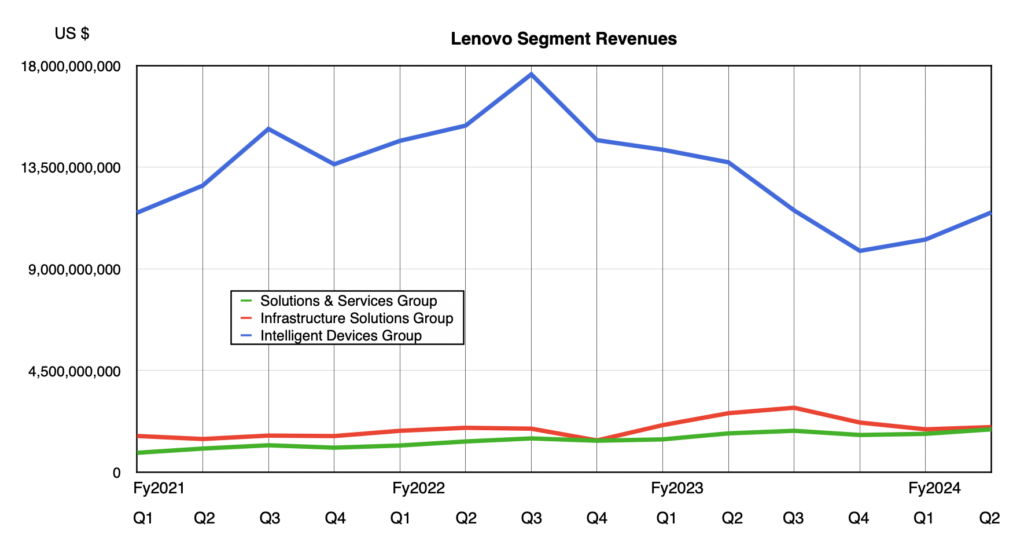
…
NetApp has claimed the #1 spot in the SPECstorage Solution 2020 EDA Blended benchmark. Net App reckons the top position in high-performance data storage for electronic design automation (EDA) affirms the effectiveness of its all-flash NetApp AFF storage solutions, which excel in scalability and low latency, meeting the ever-growing demands of EDA workloads.
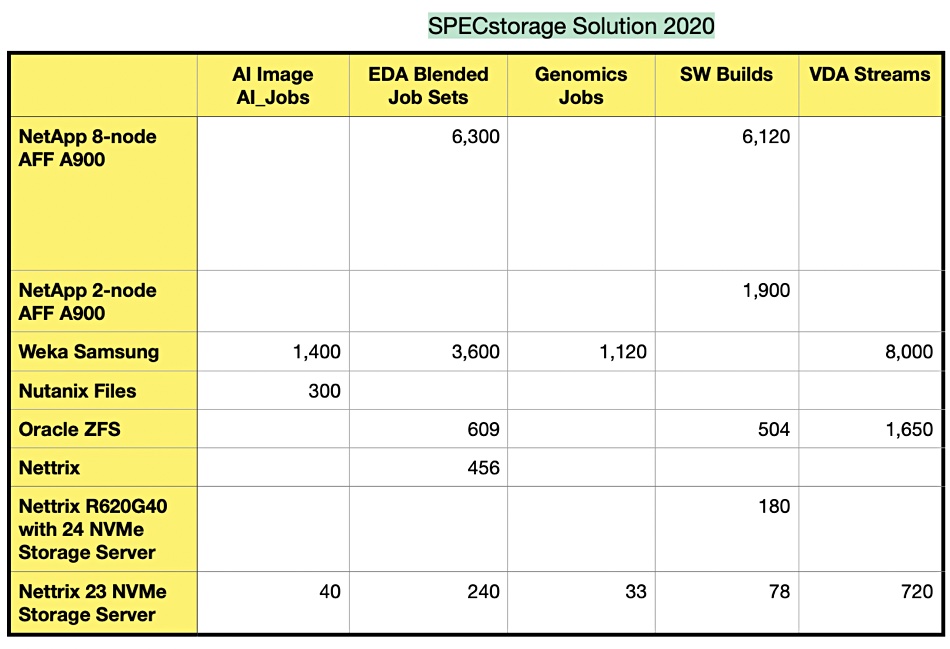
It’s hard to see how much use this benchmark has when so few suppliers appear to have submitted results. Also, is it valid to compare NetApp’s AFF A900 ONTAP with Oracle ZFS in SW Builds?
…
Panmnesia presented its CXL 3.0 All-in-One Framework powered by its proprietary CXL IP. This empowers customers to develop their own CXL 3.0 software/hardware capabilities, eliminating the need to start from scratch. A video shows a demo of this. You can download this document to gain an understanding of the framework.
…
Rubrik has been named a Leader in the IDC Marketscape for worldwide cyber-recovery vendor assessment. Other players in the Leaders quadrant are Veritas, Cohesity, Druva and Acronis. The second-ranking Major Players section of the chart includes Veeam, Commvault, Dell, Zerto and Quest. A Contenders section has two suppliers mentioned: IBM and Arcserve.
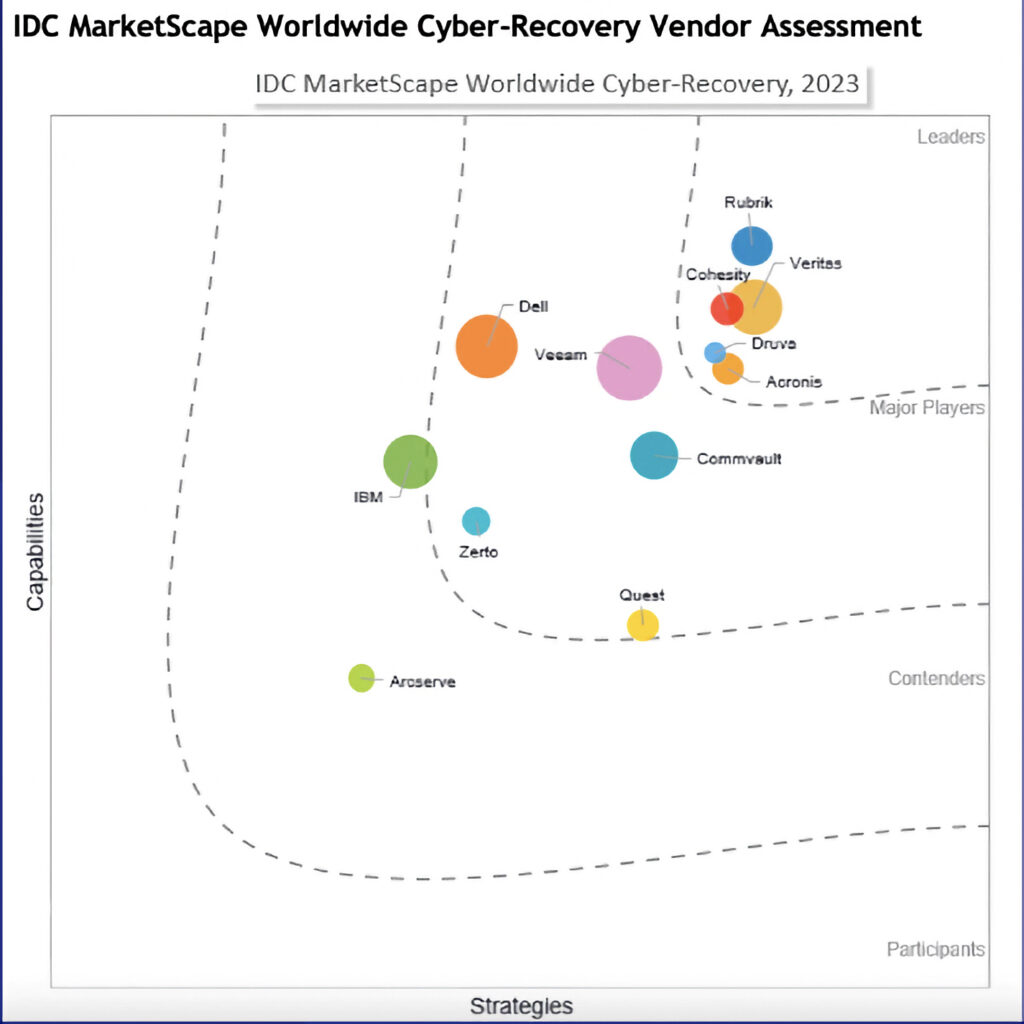
IDC’s Marketscape is a 2D square chart with two axes: Capabilities from low to high on the vertical axis and Strategies (low to high) on the horizontal axis. Suppliers are placed in sections called Leaders, with the highest ratings in capabilities and strategies, Major Players with the next-highest ratings, Contenders with the next highest, and Participants which have the lowest ratings. A supplier’s spot or bubble on the chart increases in size with their revenue.
…
SK hynix has started supplying global smartphone makers, such as Vivo, with 16 gigabyte (GB) packages of Low Power Double Data Rate 5 Turbo (LPDDR5T). It says this is the fastest mobile DRAM available today and can transfer 9.6 gigabits per second (Gbps).The LPDDR5T 16 GB package operates in the ultra-low voltage range of 1.01 to 1.12V set by the Joint Electron Device Engineering Council (JEDEC), and can process 77 GB of data per second, which is equivalent to transferring 15 full high-definition (FHD) movies in one second.
…
The SNIA announced its 2023-2024 Board of Directors and Technical Council members. The organization has more than 200 industry-leading organizations, 2,500+ active members, and more than 50,000 IT end users and IT professional members around the world.
Board of Directors: Executive Committee:
- Chair: Dr. J Metz, AMD
- Vice Chair: Richelle Ahlvers, Intel Corporation
- Secretary: Chris Lionetti, Hewlett Packard Enterprise
- Treasurer: Sue Amarin, Industry Consultant
- Member: Scott Shadley, Solidigm Technology
- Chair Emeritus: Wayne Adams, Industry Consultant
Board Members:
- Peter Corbett, Dell Technologies
- John Geldman, KIOXIA America
- Roger Hathorn, IBM
- Jonathan Hinkle, Micron Technology
- Dave Landsman, Western Digital
- David McIntyre, Samsung Corporation
- George Pamboris, NetApp
Technical Council co-chairs and members:
- Co-Chair: Bill Martin, Samsung Corporation
- Co-Chair: Jason Molgaard, Solidigm Technology
- Curtis Ballard, Hewlett Packard Enterprise
- Anthony Constantine, Intel Corporation
- Dan Hubbard, Micron Technology
- Shyam Iyer, Dell Technologies
- Fred Knight, KIOXIA America
- David Peterson, Broadcom
- Leah Schoeb, AMD
…



